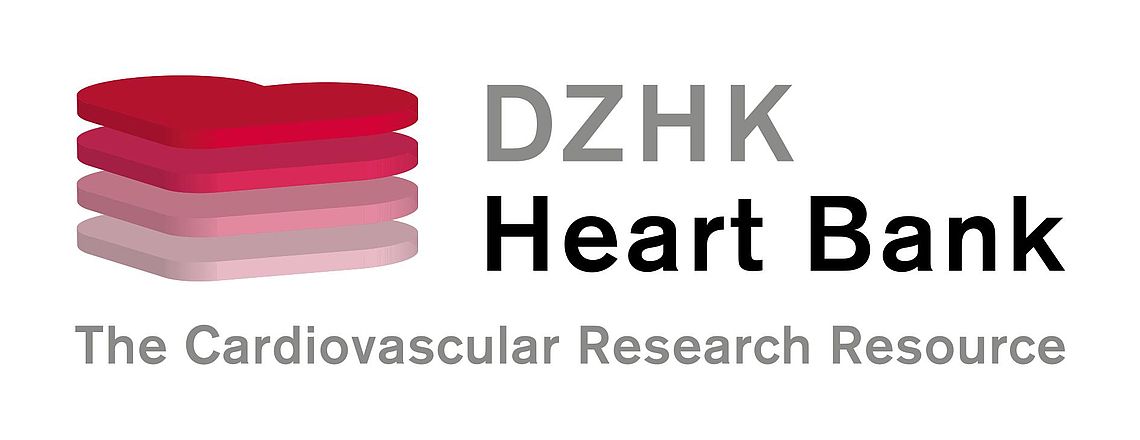Projects
DZHK Publishing Policy
Publications are an essential criterion for the success and visibility of researchers and organizations. Our Publishing Policy regulates the handling of affiliation, acknowledgment and the citation of authorship. It applies to all DZHK-funded projects as well as to projects based on the DZHK Heart Bank.
Contact
DZHK Use and Access Office
Alexandra Klatt
Tel: 030 3465 529-10
use.access(at)dzhk.de
All research projects that work with data and biosamples from the DZHK Heart Bank and that have been approved to date can be found here. You can search for the resource you are using or do a full text search.
A genomic perspective on the spread of farming to Germany
The adoption of farming by Neolithic populations is one of the most dramatic and influential ecological shifts in the recent history of our species. Recent ancient DNA (aDNA) studies have clarified longstanding questions concerning the Neolithization of Western Eurasia. By sequencing the genomes of early farmers ...
Proteomic exploration of disease mechanisms related to the novel biomarker CCN1 for prediction of death in patients with dilated cardiomyopathy
Phenotyping in heart failure using a proteomic approach constitutes the next frontier and may enable the identification of novel biomarkers and new therapeutic targets.
Epigenetic and RNA-based biomarker validation in Cardiomypathies
Diseases of the heart muscle (cardiomyopathies) are common heart diseases that often have a severe course, up to and including heart failure.
Proteogenomic discovery of endothelium-derived microproteins in cardiovascular disease
We have identified a unique set of thousands of microproteins (miPs, shorter than 100 amino acids) encoded by previously unannotated small open reading frames (smORFs) in human and murine endothelial cells.
Cardiac disease causative mutations in the Eph/ephrin signalling pathway
This project will study patients with dilated or hypertrophic cardiomyopathy that present mutations in the Eph/ephrin signaling pathway.
Identification of circulatory proteins reflecting myocardial processes relevant to disease progression in heart failure
Exploration of molecular fingerprints of patients with heart failure provides a promising approach to better understand mechanisms relevant for the development and progression of the disease.
The role of urinary Dickkopf-3 in cardiorenal syndrome
Impaired renal function is common in patients with heart failure. Up to 50 percent of patients show chronic kidney disease (CKD), associated with worse outcomes and complicates pharmacological management.
Computational assessment of genetic regulatory effects on RNA life using the DZHKomics resource
Genome-wide association studies (GWAS) have revealed tens of thousands of genomic loci associated with numerous traits and diseases; however, the underlying causal mechanism often remains poorly understood.
Characterisation and risk stratification of patient subgroups in dilated cardiomyopathy by utilisation of an inflammatory 47-plex-biomarker panel
Inflammation plays a role in the development of heart failure and dilated cardiomyopathy and cytokines are involved in these processes.
Methylation profile of circulating cell-free DNA as a diagnostic tool for heart disease stratification
Circulating cell-free DNA (ccfDNA) is released to the plasma after cell death and therefore can be used to evaluate the extension of tissue damage.
Characterization of lipidome dynamics in anthracycline-induced cardiotoxicity
Discovery and systematical characterization of Splicing Variation in Coronary Artery Disease
Genome-wide association studies (GWAS) have successfully identified over 300 gene loci contributing to the risk of coronary artery disease (CAD).
Association of single nucleotide polymorphism (SNPs) within the MAP3K12 gene with cardiovascular risk factors
The mitogen-activated protein 3 kinase 12 (MAP3K12) alias dual leucine zipper kinase (DLK) is mainly involved in the pathogenesis of neurodegenerative diseases.
Genetics of autoimmune encephalitis
Autoimmune brain inflammations are a group of rare, serious brain diseases caused mainly by auto-antibodies, which have only been known for about 15 years and lead to neurological and psychiatric symptoms.
Exercise testing in patients with asymptomatic systolic heart failure
The project will further investigate two factors related to exercise capacity in NYHA I patients: the influence of the right heart and quality of life/mental health.
Molecular markers and new therapeutic targets in patients with inflammatory cardiomyopathy
The exact pathomechanisms of inflammatory cardiomyopathy continue to be relevant to current cardiovascular science.
Exercise capacity and systolic and diastolic dysfunction in patients with NYHA I
While systolic dysfunction can be easily identified on echocardiography by using ejection fraction (EF), the diagnosis of diastolic dysfunction requires multiple criteria in echocardiography.
Mass spectrometric detection of complex lipids in calcified aortic valves
Calcific aortic valve disease (CAVD) is the most common valvular heart disease requiring treatment in the western world.
Diagnosis and risk stratification of patients with cardiomyopathy
To improve diagnosis and risk stratification of patients with cardiomyopathy, this project assesses secretome biomarker profiles via proteomic analysis methods.
No entries found for search criteria

